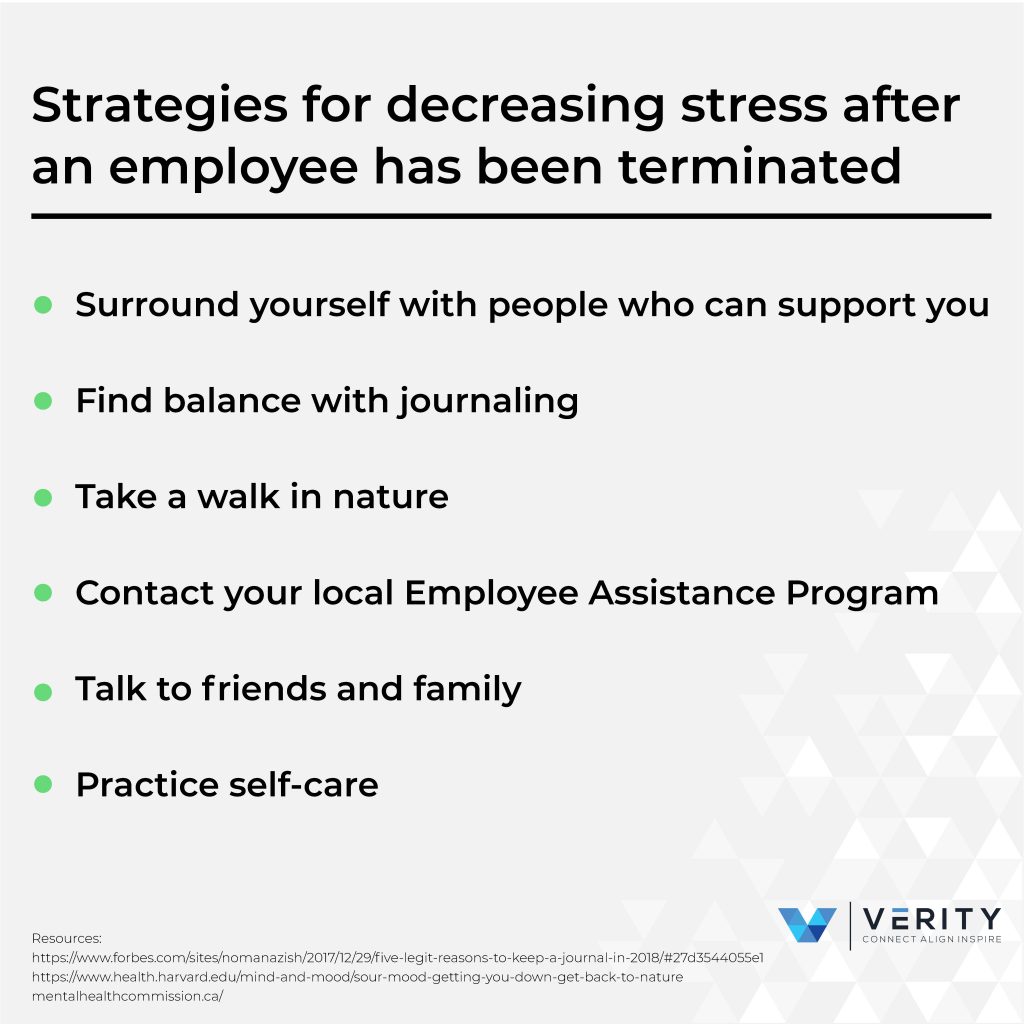If you are letting staff go, you need to consider how it might impact your remaining employees. These tips will help you support your team through the next termination.
When someone on a team is let go, or a downsizing affecting multiple employees is announced, stress, confusion, and fear can take hold of the remaining staff. Productivity can drop and morale can dip as people wonder if they are the next to go.
These are the symptoms of the toll that terminations can take on employee mental health. There are ways to avoid most, if not all, of these scenarios from happening, and they all start at the management level.
How employers can create stable environments
On the day that terminations take place, best practice is for the manager or HR to let staff know what has happened, who has been impacted, and what the next steps are. The dismissal of many employees or one can impact the performance of remaining staff, who can have the same emotional reactions as the employees who were let go. As such, it is important for leaders to show sensitivity, compassion and empathy to individuals still on the team. After the announcement, they should schedule meetings with teams and individuals. It’s crucial to have open and honest conversations with direct reports.
Although it’s not appropriate to share the exact reasons why specific individuals were selected, it is important to let team members know how their roles will be impacted by the changes. Sharing details like additional responsibilities going forward, changes to projects or any impact on the team’s goals will provide clarity to employees who might be feeling a lot of uncertainty.
Managers and leaders need to be as visible as possible and should check in with staff to see how they’re doing in the days and weeks following the announcement, rather than waiting for people to come to them. It can help if managers adopt an open-door policy during this time, one where people can feel comfortable asking their questions. This will help minimize the negative effects of the rumour mill. Small and impromptu huddles can help leaders do a pulse check and determine if any staff require additional counselling or resources. Provide your staff with training and learning opportunities, and manage workloads effectively to promote a healthy work-life balance.
Practicing mindfulness for remaining staff
In times of mental overload, it’s important for remaining staff to maintain a positive outlook. Leaders can offer these strategies to employees to manage their stress:
- Suggest ignoring the gossip and surrounding themselves with positive, supportive people.
- Advocate the benefits of journaling as a way to relieve stress and anxiety and put things in perspective.
- Encourage regular walks in nature. A study done by Harvard University suggests that being in nature can help lower blood pressure and stress hormone levels.
- It might also be helpful to reach out to their EAP (employee assistance program).
- Motivate staff to talk to friends and family about what they might be dealing with and how they’re feeling.
- Promote self-care through exercise, proper diet and personal time. A large part of managing career and life stress is taking care of yourself and preserving your mental health.
Share these tips with your team to promote healthy workplace environments:

Provide continued support to those who need it the most
Managers should ensure that everyone is physically, as well as mentally, prepared to carry out their work. Sometimes employee questions can persist for an extended period of time in a way that is not productive. If this is the case, then partnering with a career transition firm can be a good way to help staff refocus and realign with the overarching business goals. The consultant can facilitate seminars for remaining employees to discuss their concerns and bring their questions, confidentially, to management. It can be easier to talk to an impartial third party, someone employees know they can trust to bring their issues to their managers.
For more termination best practices, take a look at our Guide to Conducting Terminations.
For more information on mental health awareness and prevention, see the Mental Health Commission of Canada.
Rose Minichiello is a Managing Director at Verity, overseeing all aspects of our career transition practice. She is a career management expert with more than 30 years of experience supporting organizations during large scale restructurings, working with leaders to help facilitate change and partnering with executives in transition. Rose has a fundamental commitment to delivering service excellence to corporations and individuals going through change. Dauna Atkins is a career consultant and coach at Verity, with a wealth of experience working with a broad range of individuals. Dauna’s career management and transition experience span a wide variety of industry sectors, including private and public companies, as well as not-for-profit organizations. She has developed and delivered work-search workshops and enrichment seminars, conducted sensitive exit interviews and coached individuals through the process of acquiring the self- knowledge and insights necessary for effective career management.
Recent Posts
How to be Productive and Have an Impact While Leading Remotely
Verity International | 3 min read
Seven tips for managing yourself and engaging your team.
Building Effective Teams: A Guide with the GRPI Model
Verity International | 5 min read
The GRPI Model is a practical tool to help you foster effective teamwork using Goals, R..
The Path to Strategic Talent Management │ Part 3
Sarah Skyvington | 6 min read
How to Define a Winning Talent Strategy with Stakeholder Engagement.
